Pet Birds in Singapore: Regulations and Care Insights
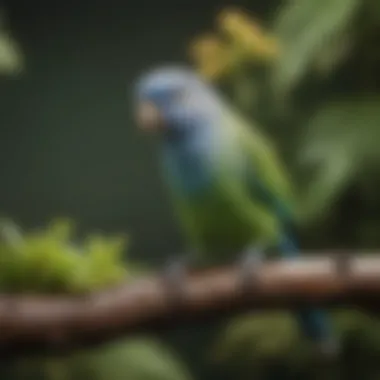
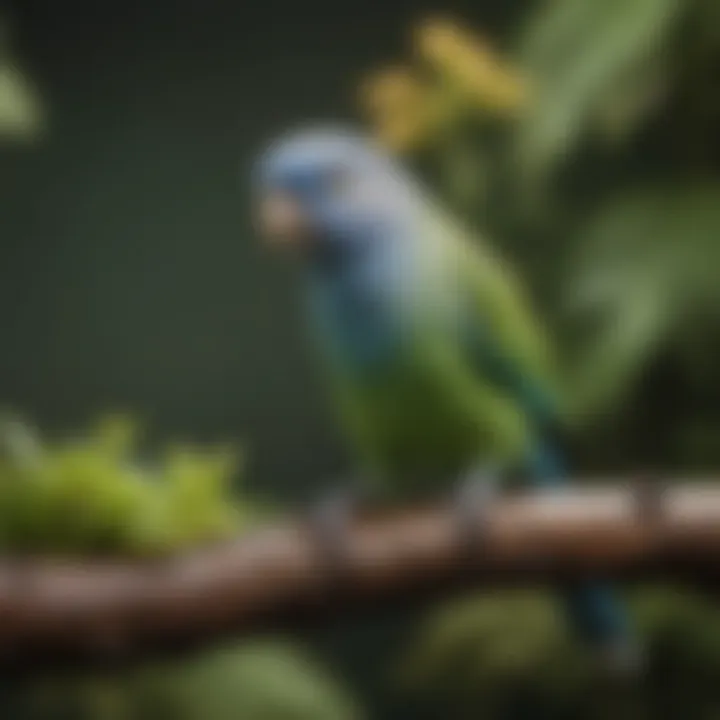
Intro
Owning pet birds in Singapore offers a unique blend of companionship and responsibility. Many individuals are drawn to the vibrant colors and melodic sounds of birds. However, potential bird owners must navigate the regulatory landscape of pet ownership in the country. This includes understanding which species are permitted, the legal ownership considerations, and the welfare practices essential for keeping birds healthy and happy.
Birds require more than just a cage and food; they need careful attention to their daily care routines, proper environmental setup, and a good diet. Understanding these aspects is crucial for bird enthusiasts aspiring to provide the best care for their feathered companions. This article aims to equip such individuals with the necessary insights into regulations and care practices.
Care Tips
Taking care of pet birds involves various daily routines and practices that ensure their well-being. Here are some key care tips:
Daily Care Routines
Birds thrive on routine. Every day, owners should provide fresh water and food. Spend time interacting with them daily, offering social engagement critical for their mental health.
Cage Setup and Maintenance
The cage must be spacious enough for the bird to move around comfortably. Include perches of varying sizes to support foot health. Regular maintenance is key; clean the cage weekly to prevent bacteria buildup.
Hygiene and Cleaning Practices
Cleaning practices include removing uneaten food and droppings promptly. Use bird-safe cleaning products to scrub surfaces as needed.
Seasonal Care Adjustments
Birds can be sensitive to seasonal changes. During colder months, ensure they are kept warm. In hotter months, provide access to shaded areas and sufficient water.
Behavioral Insights
Understanding the behavioral aspects of pet birds can enhance the owner-bird relationship significantly. Here are some insights:
Understanding Bird Body Language
Birds communicate through body language. Puffing up, flapping wings, or specific sounds can indicate various feelings. Observing these cues helps in understanding their mood.
Common Behavioral Issues and Solutions
Common issues include feather plucking and aggression. Identifying triggers and providing appropriate outlets for their energy can often resolve these problems.
Positive Reinforcement Techniques
Use reward-based methods to encourage good behavior. Treats or verbal praise reinforce positive actions, building trust between bird and owner.
Social Interaction Needs
Socialization is vital for birds. Spend time with your birds and consider having more than one to fulfill their social needs, as many species thrive better in pairs or groups.
Nutrition Guides
Proper nutrition is foundational for bird health and longevity. Here are key components to consider:
Essential Diet Components
A balanced diet includes seeds, pellets, fruits, and vegetables. Research the specific dietary needs of your bird species.
Safe and Toxic Foods
Some foods, like avocado and chocolate, are toxic to birds. Always verify food safety before offering new items.
Supplements and Treats
Consider vitamins and minerals as supplements, especially during molting or breeding periods. Treats can also promote bonding and training.
Feeding Strategies for Different Species
Different species may require varied feeding strategies. Research and adjust accordingly for optimal nutrition.
Wellness and Health
Health maintenance is an ongoing commitment. Here are some wellness tips:
Routine Health Checkups
Regular visits to an avian vet are essential. These checkups help catch potential health issues early.
Identifying Symptoms of Illness
Be observant for changes like changes in appetite, vocalization, or behavior. Early detection can be life-saving.
Preventative Care and Vaccinations
Vaccinations can be necessary depending on the species. Follow your vet's recommendations for preventative care.
Mental and Emotional Well-being
Providing stimulation through toys and interaction is essential. Boredom can lead to destructive behaviors or stress.
Enriching Activities
Birds need mental stimulation to thrive. Here are ways to keep them engaged:
Toys and Playtime Ideas
Rotate toys regularly. Offer interactive toys that challenge their minds and encourage natural behaviors.
Training and Tricks
Basic training can be enjoyable for both owner and bird. This helps build a stronger bond.
Outdoor Activities and Interaction
If possible, provide safe outdoor time. Supervised outdoor sessions allow birds to experience new sights and sounds.
DIY Projects for Mental Stimulation
Consider creating homemade toys or puzzles using bird-safe materials. Engaging their intellect keeps them happy and healthy.
Engaging and caring for pet birds requires understanding, commitment, and love. By following guidelines tailored to the laws and needs of birds in Singapore, owners can create a nurturing environment for their pets.
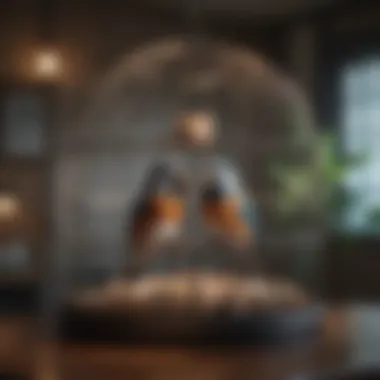

Prologue to Bird Ownership in Singapore
Bird ownership in Singapore presents a unique blend of joy and responsibility. Understanding the landscape of this endeavor is crucial for both seasoned bird owners and those entering the avian world. This section introduces the intricate web of regulations, care tips, and the overall significance of keeping birds as pets in a densely populated urban environment.
The importance of a clear legal framework cannot be overstated. Singapore has specific laws governing the ownership of pet birds. These laws are designed to protect wildlife and ensure the health and safety of domestic animals. They provide guidelines that help potential pet owners navigate the complexities of avian companionship, from selecting the right species to understanding FEs that are necessary for legal ownership.
Recognizing the benefits of avian companionship is another core element. Birds offer unique emotional rewards and companionship that can enhance one's quality of life. With their varied personalities, certain species can build strong bonds with their owners. This dynamic emphasizes the need for responsible ownership, including proper care and understanding of their needs.
As we explore this topic, it is essential to consider not just legal obligations, but also the inherent responsibilities of caring for a living creature. A deep dive into this subject equips future bird owners with insights into creating a nurturing environment that aligns with Singapore’s regulations.
Legal Framework Overview
Singapore’s legal framework regarding pet birds is comprehensive, reflecting the government's commitment to biodiversity and animal welfare. The rules established are meant to prevent the introduction of invasive species and to protect native wildlife.
Birds such as budgerigars and canaries are popular choices, and they fall under guidelines set by the Agri-Food & Veterinary Authority (AVA). Owners must familiarize themselves with specific regulations that determine what species can be kept as pets. This knowledge is vital for avoiding legal complications and ensuring compliance with local laws.
Permit requirements and responsibilities associated with pet ownership add an additional layer of necessity for prospective bird owners. Bird owners should be prepared to provide proper documentation about their pets, ensuring all birds are acquired responsibly and ethically.
Significance of Avian Companionship
The emotional and psychological benefits of companionship with birds are considerable. Avian companions can bring a sense of comfort and joy, reducing feelings of loneliness and providing a unique bond that is often unmatched by other pets.
Birds are also intellectually stimulating. Many species exhibit high levels of intelligence, capable of mimicking sounds or engaging in interactive play. This active engagement fosters a connection that can be both rewarding and enriching for the owner.
Additionally, caring for a bird encourages responsibilities that enhance the owner's sense of purpose. Routine care, social interaction, and providing for the bird’s needs become fulfilling aspects of the owner’s lifestyle. This deepens the bond, making the relationship meaningful beyond the basics of care.
Bird ownership should be approached with the understanding that it comes with obligations. Owners are responsible for the well-being of their pets. This responsibility drives the need for thorough education and adherence to guidelines that ensure both a healthy pet and a thriving relationship.
Types of Pet Birds Permitted
The discussion about types of pet birds permitted in Singapore is significant. It helps potential bird owners understand their options and the requirements for responsible ownership. Knowing which species are allowed can also help in making informed decisions that align with local regulations. This section will clarify common species that are welcomed in homes, alongside those that come with specific restrictions.
Common Species Allowed
In Singapore, several bird species are permitted as pets. The most popular among them includes the common canary, budgerigar, and cockatiel. These birds are appreciated for their varieties of colors, easy care, and engaging behaviors.
- Canary: Known for their beautiful singing capabilities, canaries are small and require minimal space. They thrive in well-maintained cages and can be fed with commercial mixes designed for canaries.
- Budgerigar (Budgie): These birds have vibrant feathers and are highly social. Budgies adapt well to household environments. They are also known for their ability to mimic sounds, making them entertaining companions.
- Cockatiel: Cockatiels are affectionate and enjoy human interaction. They have specific dietary needs but are relatively low maintenance, which attracts many first-time bird owners.
These species not only fit well in the urban living environment of Singapore, but they also enhance the emotional well-being of their owners through companionship.
Species with Specific Restrictions
While Singapore embraces various pet birds, some species face additional restrictions due to conservation concerns or their exotic nature. Owning these birds demands greater responsibility, and potential owners need to be aware of the specific legislative framework.
- Amazon Parrot: These birds are known for their intelligence and vocal ability but require special permits for ownership due to their status in the wild.
- African Grey Parrot: Renowned for their cognitive skills, these parrots face legal scrutiny. They necessitate comprehensive care, which includes significant space and mental stimulation.
- Macaws: Large and colorful, macaws are visually striking, but they require a substantial commitment regarding resources and time.
Owning these birds can bring immense joy, but intricate laws and the need for specialized maintenance underscore the responsibility that comes with their companionship. Understanding the regulations around these species is crucial for aligning ownership with ethical standards and legal compliance.
Regulatory Bodies Involved
Understanding regulatory bodies involved in pet bird ownership in Singapore is crucial. These organizations create guidelines and rules that ensure the protection of both the birds and the environment. They manage issues like species conservation and pet care standards.
Such regulations provide a framework for responsible ownership. This includes ensuring that pet birds are sourced from ethical breeders and countries. Compliance with legal stipulations helps to maintain the ecological balance and protect native wildlife.
Knowledge of these bodies is valuable for aspiring bird owners. It allows them to navigate the legalities and responsibilities associated with owning a pet bird. These regulatory bodies work to promote both animal welfare and sustainable practices in pet ownership.
Agri-Food & Veterinary Authority (AVA)
The Agri-Food & Veterinary Authority of Singapore plays a vital role in managing pet bird regulations. Their responsibilities include enforcing laws related to the importation and welfare of birds. They ensure that birds entering Singapore do not carry diseases that could threaten local wildlife or public health.
The AVA also provides guidelines for responsible ownership. They educate bird owners on proper care and management practices. For instance, they emphasize vaccination and health checks as essential components of bird care. This helps prevent the spread of avian diseases not just among pets but also to wild birds.
Bird owners are often required to register their pets with AVA. This process ensures that owners have access to reliable information about care and regulations. The AVA also offers resources for those looking to understand the legal aspects of bird ownership in Singapore, making it easier for new owners to comply with the regulations.
Wildlife Reserves Singapore
Wildlife Reserves Singapore contributes to the management and protection of various bird species. They focus on conservation efforts, particularly for threatened and endemic birds. Their mission aligns with preserving biodiversity and educating the public on wildlife conservation.
They provide awareness programs and resources aimed at bird owners. This serves to instill a sense of responsibility among pet owners. Owners are encouraged to understand their birds' natural behaviors and needs, promoting overall happiness and health.
Additionally, in cases of rescue or rehabilitation, Wildlife Reserves Singapore plays a crucial role. They take in injured or abandoned birds and work towards rehabilitating them. This reinforces the collaborative effort between pet ownership and conservation, highlighting the importance of a commitment to avian welfare in Singapore.
"Education on bird care and conservation fosters a deeper understanding of our feathered friends, which benefits both owners and wildlife."
Permits and Documentation
Understanding permits and documentation for pet birds in Singapore is essential for any potential bird owner. Proper documentation ensures compliance with the laws, protecting both the owner and the birds. To own a pet bird legally, one must navigate the requirements set forth by relevant authorities. This section discusses these requirements in detail and guides how to acquire the necessary permits.
Requirements for Pet Bird Ownership
To own a pet bird in Singapore, specific regulations must be adhered to. Essential requirements include:
- Age Restrictions: The owner must be at least 16 years old. This is to ensure that the individual is mature enough to take responsibility for the pet.
- Species Compliance: Only specific species of birds are permitted. It is vital to know which birds are legal and which are classified as exotic or restricted.
- Microchipping: Some birds may require microchipping for identification purposes. This ensures pets can be returned to their owners if lost.
- Health Clearances: Health certifications from qualified veterinarians are necessary to confirm the bird is free from specific diseases.
Meeting these requirements creates a foundation for responsible ownership and contributes to the wellbeing of the birds. Not following these regulations can result in penalties, including fines or confiscation of the bird.
How to Apply for Necessary Permits
The application for permits involves several steps. Here’s a streamlined process:
- Determine Eligibility: Before applying, ensure that you meet the required criteria.
- Gather Documentation: Prepare all relevant documents, such as proof of age, identification, and health clearances.
- Online Application: Visit the Agri-Food & Veterinary Authority website to access the e-services portal. Fill out the required forms completely and accurately.
- Payment of Fees: An applicable fee may need to be paid during submission. This fee varies based on the type of permit being applied for.
- Await Processing: After submission, there will be a waiting period. It can take several weeks for the application to be processed.
- Permit Approval: Once the permit is approved, you will receive notification. Always keep a copy of the permit for records.
"Understanding and adhering to permit regulations is the first step in responsible bird ownership. Non-compliance can lead to serious implications."
Health Considerations for Pet Birds
Understanding the health considerations for pet birds is essential for any bird owner in Singapore. By recognizing the most common health issues that can affect avian companions, pet owners can take proactive measures to ensure their birds lead healthy lives. Care for birds needs to encompass their unique physiological needs, as they are often more susceptible to certain health problems than other pets. Apart from addressing specific health issues, it is vital to adopt preventive care strategies, which can significantly enhance their overall well-being.
Common Health Issues
Pet birds can suffer from various health issues, which need attention from their owners. Some common health issues include:
- Respiratory Problems: Birds are prone to respiratory infections, especially in humid conditions. Symptoms can include wheezing or difficulty breathing.
- Feather Disorders: Many birds experience issues with feather plucking or molting problems. Poor diet, stress, or illness can exacerbate these conditions.
- Obesity: Overfeeding and lack of exercise can lead to obesity in birds, which poses significant health risks. Signs include difficulty in moving and excessive weight.
- Gastrointestinal Disorders: Birds can face challenges with their digestive systems, leading to symptoms like diarrhea or vomiting. This can be caused by changes in diet or infections.
- Psittacine Beak and Feather Disease (PBFD): This viral infection affects feathers and beaks, leading to severe feather loss and deformities. Early diagnosis and care are crucial.
Proper awareness about these issues can allow bird owners to provide immediate care and treatment.
Feeding and Nutrition Requirements
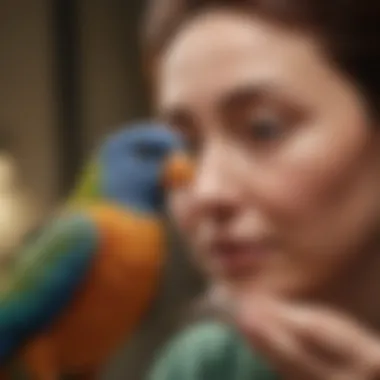
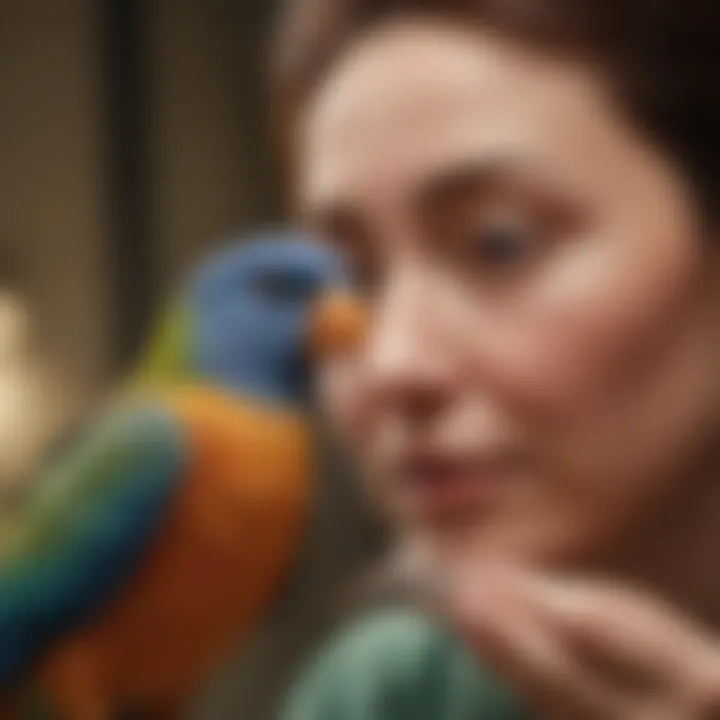
Feeding and nutrition for pet birds is a crucial aspect of their care. A balanced diet influences both their physical health and psychological well-being. Understanding the dietary needs of birds can prevent many health issues and enhance their quality of life. Bird owners must be aware of what their feathered companions require. This ensures that they thrive in a home environment.
Understanding Dietary Needs
Different species of birds have specific dietary requirements. Some may require seeds, while others benefit from fresh fruits and vegetables. For example, parrots often need a high-fat diet that includes nuts, while finches may thrive on seeds. It is essential to provide a diet that mimics their natural feeding habits.
Factors to consider include:
- Age: Young birds may require different nutrients than older ones.
- Species: Each bird species has unique dietary requirements based on their metabolism and natural habitat.
- Health Conditions: Certain health issues might necessitate special diets to help manage their conditions.
By understanding these factors, bird owners can formulate a more appropriate nutrition plan for their pets. This practice can lead to healthier birds and prevent unnecessary veterinary expenses.
Recommended Food Brands and Products
Choosing the right food brands and products is vital for ensuring your bird's dietary needs are met effectively. Not all bird food products are created equal. Quality brands often provide well-balanced nutrients designed for specific bird species. Here are some recommended food brands:
- Harrison's Bird Foods: Known for its organic and all-natural ingredients, suitable for various types of birds.
- Kaytee: A widely recognized brand that offers a range of bird seeds, pellets, and treats tailored for different species.
- Zupreem: Offers a variety of pellets and nutrition-rich food options that cater to the needs of both small and large birds.
When selecting a product, it is essential to read the labels. Ensure that the diet is complete with vitamins, minerals, and essential amino acids.
A diverse diet leads to healthier birds, lower medical bills, and a happier environment.
Avoid seed mixes that lack essential nutrients. These can lead to malnutrition over time. Always consult with avian veterinarians to create the best feeding strategy based on individual needs. Engaging with the community through forums on platforms like Reddit can offer insights into others’ experiences and recommendations.
Creating an Ideal Living Environment
Creating an ideal living environment for pet birds is crucial in ensuring their overall well-being and happiness. Birds, being social and intelligent creatures, thrive in settings that cater to their physical and psychological needs. An appropriate habitat can help reduce stress, prevent behavioral issues, and promote a healthy lifestyle. Moreover, it contributes to a better bond between the bird and its owner.
Cage Selection and Design
When selecting or designing a cage for your pet bird, several factors should be taken into account. First, the size of the cage must correspond to the species of the bird. For larger birds like cockatoos or macaws, spacious cages are essential, allowing them to stretch their wings and move around freely. Smaller birds, such as budgerigars, still require enough space to flap their wings without restriction.
Materials used for the cage construction are also important. Opt for durable metal cages rather than plastic, as they are easier to clean and do not harbor harmful bacteria. Look for cages with powder-coated finishes to avoid lead or zinc exposure. Additionally, ensure that the bar spacing is appropriate for the bird species.
A well-designed cage should include numerous perches at various heights to encourage climbing and exercise. Consider incorporating horizontal bars or attached play gyms to stimulate natural behaviors like climbing and exploring. Proper ventilation is key; cages should have openings to provide fresh air while preventing drafts.
Enrichment and Socialization
Birds are inherently social animals and need mental stimulation to maintain their well-being. Thus, enriching their environment with toys and activities is important. Consider varying the types of toys: some birds enjoy puzzle toys that challenge their intellect, while others may favor swinging or chewing toys to satisfy their natural instincts. Rotating toys regularly keeps the bird engaged and curious, preventing boredom.
Creating social opportunities is equally essential. Birds that feel isolated or neglected may develop behavioral problems, such as feather plucking or excessive screaming. Make sure to spend time interacting with your pet bird. Talking, singing, or simply being near them can replicate the presence of their flock, which contributes to their overall happiness.
Key Considerations:
- Choose a cage that suits the bird's size.
- Use safe, durable materials for construction.
- Include various perches and play areas to promote exercise.
- Offer multiple types of toys to stimulate interest and curiosity.
- Spend quality time with your bird to foster bonding and reduce loneliness.
"A proper living environment not only supports physical health but also promotes a positive emotional state for pet birds."
By focusing on these essential elements, bird owners can create a harmonious habitat that enhances their pets’ lives, making bird ownership a rewarding experience.
Behavioral Insights for Pet Birds
Understanding the behavioral insights of pet birds is vital for several reasons. Birds are social creatures, and understanding their behaviors can greatly enhance their quality of life. When owners grasp avian behavior, they can create a more suitable environment that considers the psychological and emotional needs of these animals.
Birds exhibit a wide range of behaviors that can indicate their health, comfort, and stress levels. Recognizing these signals helps pet owners respond appropriately, ensuring happier and healthier birds. This knowledge also fosters a stronger bond between birds and their owners, enhancing the overall pet ownership experience.
Understanding Common Behaviors
Bird behavior can vary significantly among species, but some common behaviors can be observed across many types of pet birds. For instance, vocalizations serve as a primary means of communication. Birds may chirp, squawk, or sing to express their feelings. Understanding these vocal clues can provide insight into their mood. Additionally, body language plays a crucial role. A bird that puffs up its feathers might be feeling threatened, while a bird that bows its head may be inviting petting.
Also, activities such as preening are essential for hygiene and comfort. Birds spend considerable time grooming their feathers, which helps them maintain insulation and a healthy appearance. Noticing changes in grooming habits may signal stress or illness, prompting the owner to take further action.
Birds also engage in exploratory behaviors, such as climbing and playing, which are essential for physical and mental stimulation. Providing diverse enrichment opportunities like toys and perches encourages natural behaviors and keeps them engaged.
Key behaviors to monitor include:
- Vocalizations: Indicates mood and emotional state.
- Preening: Indicates health and comfort levels.
- Exploration: Indicates curiosity and engagement with the environment.
Training Techniques for Compliance and Bonding
Training pet birds is not only beneficial for compliance with rules but also builds a strong bond between the bird and its owner. Establishing trust is essential for effective training. Using positive reinforcement techniques, such as treats or praise, can encourage desired behaviors.
One effective method is clicker training. In this approach, a click sound signals to the bird that a reward is forthcoming. For example, if a bird steps onto the owner’s finger when prompted, the owner clicks and offers a small treat. This reinforces the behavior, making it more likely to occur in the future.
Additionally, training sessions should be kept short, around 5 to 10 minutes, to prevent frustration. Birds have limited attention spans, and shorter, more frequent sessions are typically more productive.
Consistency is key in training. Commands should be repeated consistently over time, using the same words and gestures for clarity. This helps the bird associate the command with the desired action.
- Positive Reinforcement: Focus on rewarding good behavior rather than punishing bad behaviors.
- Clicker Training Method: Use sound to signal rewards for desired actions.
- Short Sessions: Limit training to avoid fatigue and frustration.
- Consistency in Commands: Use the same phrases and gestures regularly.
Understanding and applying behavioral insights can lead to a more fulfilling experience for both pet birds and their owners. Thus, investing time in learning about avian behavior and training can enhance the overall pet ownership experience.
Emergency Procedures and First Aid
Having a pet bird requires more than just feeding and proper housing. An essential aspect of being a responsible bird owner is understanding emergency procedures and basic first aid. Recognizing critical situations quickly can save a bird’s life. Birds are often vulnerable to various health issues and accidents that may occur in their environment. Being equipped with the right knowledge can be the difference between recovery and tragedy.
Recognizing an Avian Emergency
It is vital for pet bird owners to be able to identify signs of distress or illness in their birds. Common signs that indicate an avian emergency include:
- Lethargy: If your bird is unusually inactive or reluctant to move, this may indicate a serious problem.
- Difficulty Breathing: Watch for open-mouth breathing or tail bobbing, which can suggest respiratory distress.
- Excessive Vocalization or Silence: Changes in normal vocal patterns could point to discomfort or pain.
- Changes in Droppings: Unusual color, consistency, or frequency of droppings can signal digestive problems.
- Fluffed Feathers: A bird that is puffed up for an extended time is likely unwell.
Timely recognition of these signs can prompt immediate action. If an avian emergency is suspected, contacting a veterinarian experienced in avian care is crucial. It is wise to keep contact information for local avian vets readily available.
Immediate First Aid Responses
In case of an emergency, knowing basic first aid can be incredibly useful until professional help is reached. Here are some important first aid responses for emergency situations affecting birds:
- Keep Calm: Birds can pick up on their owner’s anxiety, which can increase their stress levels.
- Handle with Care: If your bird is injured, handling it gently can prevent further injury. Use a towel to wrap the bird lightly if it is flapping or panicking.
- Assess the Situation: Determine the nature of the emergency. Is it bleeding, choking, or unable to move?
- Control Bleeding: If the bird is bleeding, apply gentle pressure with a clean cloth or bandage on the area. Elevate the wound if possible.
- Administer Rescue Breaths: If the bird is not breathing, provide air by gently closing its beak and breathing into its nostrils.
- Treat for Shock: Keep the bird warm and quiet, minimizing disturbances as shock can be life-threatening.
"First aid knowledge can make a significant difference in the outcome during a critical time."
In an avian emergency, every second counts. By having a basic understanding of these procedures, bird owners can act swiftly, giving their beloved pets the best chance of recovery.
Community Resources and Support Networks
The realm of pet bird ownership in Singapore demands not only adherence to regulations but also active engagement within community resources. These resources, including local veterinarians and belonging to enthusiast groups, are key pillars that support responsible bird care. They provide vital knowledge, foster connections among fellow bird owners, and enhance the overall experience of owning a pet bird. Understanding the value of these networks can significantly impact a bird owner's ability to provide a thriving environment for their feathered companions.
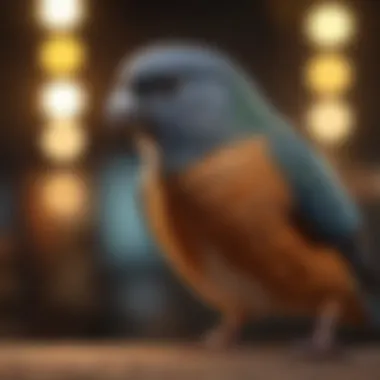
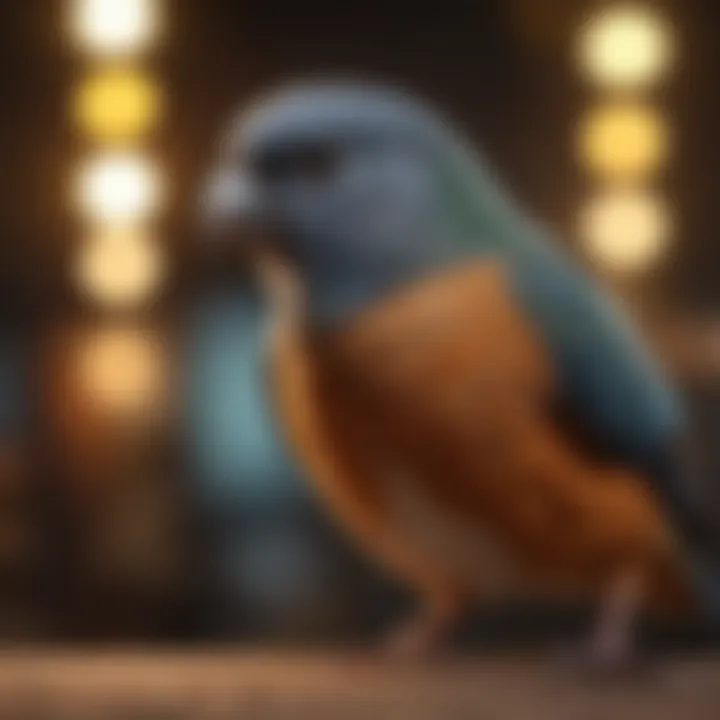
Local Avian Veterinarians and Clinics
In Singapore, local avian veterinarians play an instrumental role in the health and care of pet birds. These specialized professionals possess the necessary training to address a variety of health issues unique to birds. Regular check-ups and vaccinations are critical for maintaining the welfare of pet birds. Access to a qualified avian veterinarian can help owners manage health concerns before they escalate.
Key benefits of having a local avian veterinarian include:
- Expertise in Avian Medicine: Understanding the unique biology of birds ensures effective diagnosis and treatment.
- Preventive Care: Routine visits can help catch potential health problems early, promoting longevity and well-being.
- Emergency Care: A nearby vet can provide immediate assistance during a crisis, drastically improving outcomes.
- Educational Resources: These professionals can guide bird owners on proper care practices, including diet and habitat requirements.
Having a relationship with a local clinic should be a priority for any bird owner. An avian veterinarian can become a lifelong partner in ensuring the health and happiness of your pet.
Bird Enthusiast Groups and Clubs
Bird enthusiast groups and clubs serve as social hubs for pet bird owners. Engaging with these communities offers various advantages, such as shared experiences, collective knowledge, and emotional support. Individuals participating in such groups can obtain valuable insights into better care for their birds and even share tips about local regulations.
Joining a bird club can benefit owners in several ways:
- Networking Opportunities: Owners can connect with like-minded individuals, forming friendships that can lead to prolonged support and advice.
- Access to Events and Workshops: Many clubs organize educational sessions, allowing owners to learn from experts about avian behavior, nutrition, and care.
- Resource Sharing: Whether it's about finding high-quality food, toys, or safe habitats, enthusiasts share leads on the best resources.
- Community Advocacy: Groups often engage in efforts to promote bird welfare and advocate for responsible pet ownership policies in Singapore.
In summary, community resources and support networks are invaluable to pet bird owners in Singapore. Local avian veterinarians provide essential health services, while bird enthusiast groups foster camaraderie and knowledge-sharing. Together, these resources enhance the experience of pet ownership, ultimately leading to healthier, happier birds.
Environmental Considerations in Bird Care
Considering the environment in which pet birds are kept is crucial for their overall well-being. Birds are sensitive creatures; their health and happiness can be directly influenced by various environmental factors. These considerations do not merely entail providing a cage or a perch; they encompass a broader perspective on the ecological and climatic conditions that impact their daily lives.
Climate Impact on Avian Well-Being
Birds are affected by the climate in several profound ways. First, temperature extremes can lead to stress in pet birds. High humidity and excessive heat can result in dehydration, while cold temperatures can cause discomfort or even illness. It is essential to maintain a stable room temperature—ideally between 20°C to 25°C—within their living space. Consider using heating lamps or humidifiers to achieve this.
Moreover, direct sunlight can be both beneficial and harmful. Sunlight promotes Vitamin D synthesis, which is vital for calcium absorption. However, prolonged exposure without adequate shade can lead to overheating or sunburn. Therefore, it is advisable to position cages in a manner that allows for natural light while also providing areas for shade.
Furthermore, air quality plays a significant role in avian health. Birds are sensitive to pollutants such as smoke, strong odors, and chemical residues. It's important to ensure good ventilation and minimize exposure to direct smoke or fumes from household cleaning products. Using air purifiers can also help in maintaining a healthy environment.
Sustainable Practices in Pet Bird Ownership
Sustainability is not just a buzzword; it is a necessary approach for responsible pet ownership, especially concerning avian companions. There are several ways to integrate sustainable practices into bird care.
- Choosing Sustainable Bird Food: Many bird owners may not realize that some types of bird feed can negatively impact the environment. Selecting organic bird feed that is free from pesticides and harmful additives will not only support your bird's health but also promote sustainable agricultural practices.
- Providing Enrichment with Natural Materials: Instead of opting for synthetic toys, consider using natural wood or biodegradable items. This minimizes waste and provides your bird with appropriate materials to chew and explore.
- Conserving Resources: Simple actions, such as using water-efficient cleaning methods for cages or recycling old newspapers for lining, can significantly contribute to a more eco-friendly approach to bird care.
- Supporting Conservation Efforts: Engaging with organizations that promote avian conservation can further the protection of birds and their habitats. Participating in local initiatives, whether they be fundraising for shelters or volunteering, increases awareness about the importance of birds in our ecosystem.
"Caring for our feathered friends goes beyond keeping them safe indoors; it involves a commitment to the environmentally sound practices that benefit both birds and their habitats."
These considerations create a better quality of life for pet birds while also contributing positively to environmental conservation. The synergy between bird care and environmental responsibility exemplifies what it means to be a conscientious pet owner.
Legal Implications of Owning Exotic Birds
Understanding the legal implications of owning exotic birds is critical for responsible pet ownership in Singapore. With a unique biodiversity and strict regulations, Singapore helps to protect its wildlife while allowing citizens to enjoy avian companionship. The rules around pet birds are not just about the animals themselves but also touch upon significant ethical and environmental considerations. Comprehending these regulations can protect birds and owners from serious legal repercussions.
Differentiating Between Exotic and Native Species
Exotic birds are species not naturally found in Singapore. Examples include species like the African Grey Parrot and the Macaw. In contrast, native species, such as the Asian Koel and the Yellow-vented Bulbul, are naturally found in the region. It is vital to understand these distinctions as they dictate which birds can be legally owned as pets.
Key differences include:
- Ownership Regulations: Exotic birds often require permits, while native birds may have restrictions based on conservation status.
- Care Requirements: Native birds may adapt more easily to local climates, unlike some exotic species that might need specific environments.
A clear understanding of these categories helps prospective bird owners comply with laws and gives insight into proper care for their chosen pet species.
Consequences of Non-Compliance
Non-compliance with laws regarding exotic birds can lead to significant penalties. In Singapore, these consequences vary, but they often include fines and legal action. Penalties may involve:
- Monetary Fines: These can be substantial, sometimes reaching several thousand Singapore dollars for severe offenses.
- Seizure of Animals: Authorities may remove birds that are kept illegally, often leading to distress for both the owner and the bird.
- Legal Charges: In some cases, ongoing legal actions or criminal charges can arise from violating wildlife protection laws.
"Adhering to the laws regarding exotic birds is not merely a legal obligation; it’s a responsibility towards the conservation of our ecosystem."
Legal implications are profound for owners and their birds. Understanding and respecting these regulations ensures that both species thrive in a safe and well-regulated environment.
The Role of Education in Avian Care
Education plays a pivotal role in responsible bird ownership. Understanding avian needs is critical for the health and overall well-being of pet birds. This responsibility includes knowledge about correct feeding, behavioral insights, and environmental adjustments. By fostering a solid educational foundation, bird owners can ensure their pets flourish in a safe and fulfilling environment.
Moreover, education helps to prevent common health issues. Misunderstanding any aspect of bird care can lead to significant health problems. For instance, improper nutrition can cause malnutrition or toxicity. Thus, it is crucial for bird owners to invest time in learning about their pets' specific requirements and behaviors.
"Knowledge is power," particularly when it comes to understanding the delicate nature of avian care.
Importance of Informational Workshops
Informational workshops provide a hands-on approach to bird education. These workshops often cover a variety of topics, from health care to training techniques. Attendees can interact with experienced avian veterinarians or seasoned bird owners. This interaction creates a context for asking questions and discussing concerns specific to their pet birds.
Workshops can address challenges that bird owners face. For new owners, the opportunity to learn directly from professionals can alleviate fears and build confidence. Additionally, workshops can foster a sense of community among bird enthusiasts. Networking with others in the local area offers support and resource sharing.
Benefits of attending workshops include:
- Practical skills: Gaining knowledge that can be put into action immediately.
- Expert advice: Receiving guidance from those who understand avian care thoroughly.
- Peer support: Forming connections with other bird owners for shared learning.
Utilizing Online Resources for Continuous Learning
The digital age presents a plethora of online resources dedicated to avian care. These resources offer a flexible way for owners to expand their knowledge. Websites, forums, and social media platforms serve as valuable tools for education.
Online forums like Reddit provide spaces where bird owners can discuss specific concerns. These discussions often lead to diverse perspectives and solutions. Additionally, platforms like Facebook host groups specifically for bird enthusiasts to exchange tips and experiences.
Popular online resources include:
- YouTube: For visual demonstrations on bird care practices.
- Blogs and Websites: Such as avian-related content on encyclopedic platforms like Britannica.
- Social media groups: To connect with fellow bird enthusiasts and share real-time information.
This continued learning approach encourages responsible care as owners stay updated on the latest research and trends in avian health. Thus, education—whether through workshops or online resources—strengthens the bond between bird owners and their feathered companions.
Ending
The conclusion serves as a critical component in understanding the various aspects of owning pet birds in Singapore. It encapsulates the core themes explored throughout the article, highlighting several key points regarding legality, care, and the broader implications of avian companionship. The article not only emphasizes the regulations that govern bird ownership but also offers insights into the responsibilities that come with it.
Summary of Key Points
- Legal Framework: The regulatory framework surrounding pet birds is stringent. This ensures that both native and exotic species are kept responsibly.
- Health Care: Regular veterinary check-ups and awareness of common health issues are vital.
- Behavioral Awareness: Understanding bird behavior aids in effective training and creates a harmonious living environment.
- Community Support: Engaging with local communities and online forums enhances knowledge and support among bird owners.
By grasping these elements, potential bird owners can make informed decisions and foster a more enriching experience for both themselves and their feathered companions.
Final Thoughts on Bird Ownership in Singapore
Owning a pet bird is a journey filled with unique experiences and challenges. The regulations in Singapore aim to safeguard wildlife and promote responsible pet ownership. Navigating these laws can feel daunting, but they provide a solid framework to ensure that bird owners act ethically.
Moreover, consideration of environmental factors and proper care practices cannot be overlooked. A well-informed owner significantly improves the chances of providing a high quality of life for their bird. Therefore, ongoing education about bird care is crucial.
In summary, this article offers important guidelines and insights that reinforce the significance of responsible bird ownership. Bird owners in Singapore are encouraged to engage with resources, stay updated on regulations, and delve into the joy that comes from raising these intelligent and social creatures.















